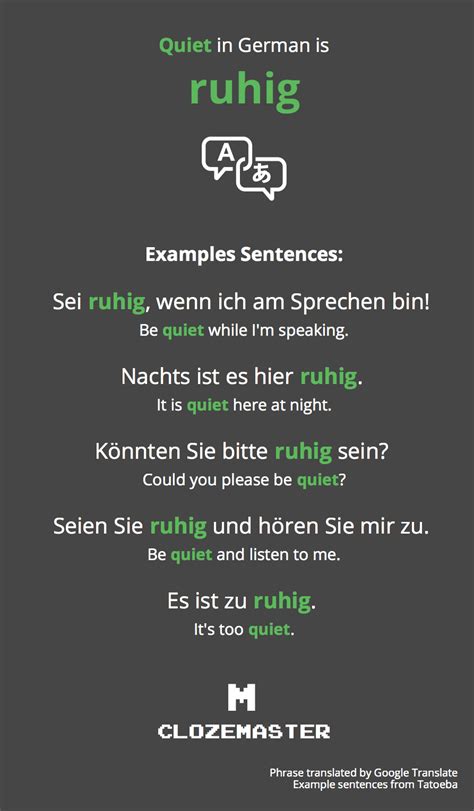How to Say "Be Quiet" in German: A Comprehensive Guide
Learning a new language opens doors to new cultures and communication. Knowing how to politely (and impolitely!) tell someone to be quiet in German is a valuable skill. This guide will equip you with various ways to say "be quiet" in German, from gentle requests to more forceful commands, ensuring you choose the right phrase for the situation.
Different Ways to Say "Be Quiet" in German
The best way to say "be quiet" in German depends heavily on context. Are you addressing a child? A colleague? A stranger? Your choice of words should reflect the situation's formality.
1. Quiet, Please! (Formal & Polite)
Bitte, seien Sie ruhig!(Please, be quiet!) This is the most formal and polite way to ask someone to be quiet. It's appropriate for situations where you need to maintain decorum, such as in a library or a formal setting.Seien Sieis the formal "you" form of the verb "to be."
2. Be Quiet, Please! (Informal & Polite)
Bitte, sei ruhig!(Please, be quiet!) This is a more informal version, suitable for friends, family, or colleagues you're on familiar terms with.Seiis the informal "you" form of the verb "to be."
3. Quiet! (Informal & Direct)
Ruhig!(Quiet!) This is a short, sharp command. It's suitable for situations where you need to quickly restore silence, but it can come across as somewhat abrupt. Use this with caution and only when appropriate.
4. Hush! (Informal & Gentle)
Psst!(Psst!) This is a softer, more gentle way to get someone's attention and ask for quiet. It's often used to subtly signal someone to be quiet rather than giving a direct command.
5. Be Still! (More forceful)
Still!(Still!) This is a more forceful way of saying "be quiet," implying a need for immediate silence. It's generally used in situations where there's a significant disruption.
6. Shut Up! (Informal & Rude - Use with Extreme Caution!)
While there isn't a direct translation for "shut up" that's as commonly used as in English, phrases like Halt die Klappe! (literally "hold your mouth shut!") or Sei still! (be still!) used forcefully can convey a similar meaning. However, these are very rude and should be avoided unless in extremely informal settings with close friends and even then, used sparingly.
Choosing the Right Phrase
Consider your audience and the context when deciding which phrase to use. A polite request is always preferable unless the situation demands a more forceful approach. Remember that tone of voice plays a crucial role in conveying your message, even more so than the words themselves.
Beyond the Basics: Expanding your German Vocabulary
Mastering different ways to say "be quiet" is just the beginning. Learning other expressions related to noise and silence will further enhance your communication skills in German. Consider exploring vocabulary related to loud noises, quiet environments, and ways to politely request someone to lower their volume.
By understanding the nuances of these different expressions, you'll be able to communicate your request for quiet effectively and appropriately in any situation. Happy practicing!
